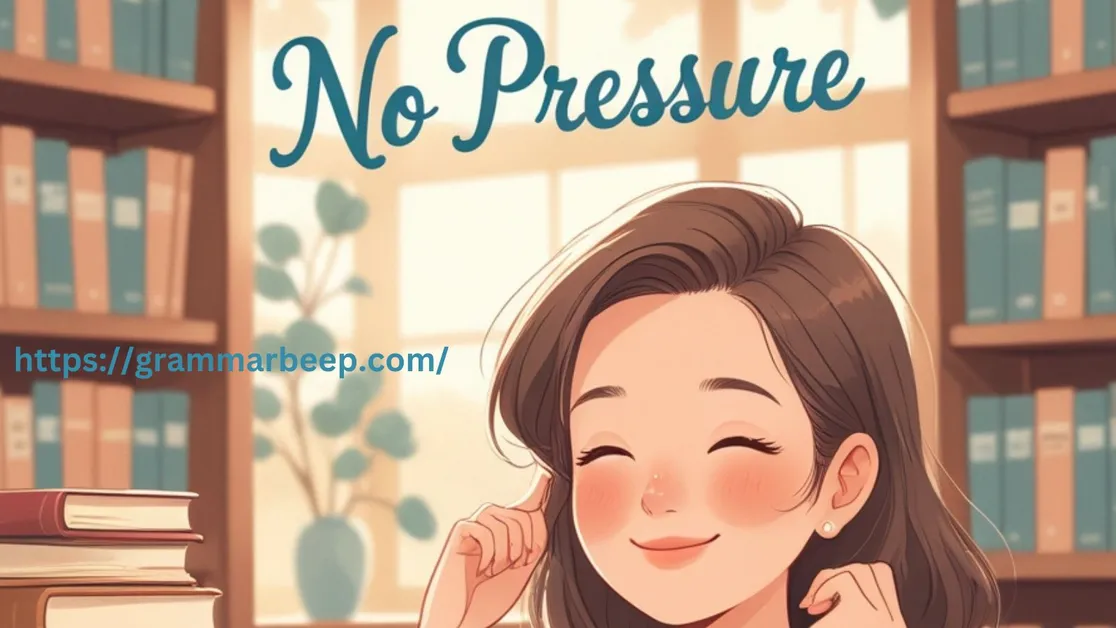20 Professional Ways to Say “No Pressure” is your essential guide to mastering polite communication in any workplace. Saying “no pressure” might seem simple, but choosing the right words can make all the difference in maintaining a formal tone and showing respecting recipient’s time. This article offers practical alternatives that help you convey ease without losing professionalism, whether in emails or meetings.
Effective communication is key in today’s fast-paced business world. With these 20 alternatives, you will learn how to express flexibility and reduce stress in your professional context while managing work deadlines and scheduling meetings with tact and clarity.
At Your Convenience
One of the most common and respectful ways to say “no pressure” is “at your convenience.” This phrase is ideal for formal requests where you want to give someone the freedom to respond at convenience without imposing.
Example Email:
Subject: Document Review
Dear Sarah,
Please review the attached report at your convenience. There’s no urgency, so feel free to take the time you need.
Best regards,
Michael
This expression shows showing consideration for the recipient’s schedule while maintaining a formal tone.
When You Have a Moment
Using “when you have a moment” is a gentle way to suggest a task or response can be done whenever the person is free, emphasizing ease and flexibility in communication.
Example Email:
Subject: Quick Feedback Request
Hi David,
Could you please have a look at the draft proposal when you have a moment? No rush—your input is appreciated whenever convenient.
Thanks,
Linda
This phrasing balances urgency with reducing stress, making it clear the task is important but not urgent.
Check out this: 21 Other Ways to Say “I Would Like To”
As It Suits You
The phrase “as it suits you” implies the recipient can decide the timing that works best, ideal for task prioritization and polite phrasing in collaboration.
Example Email:
Subject: Feedback on Presentation Slides
Hello James,
Feel free to provide your feedback on the slides as it suits you. I want to make sure you’re comfortable with the timing.
Regards,
Priya
This highlights communication tact by respecting the recipient’s time constraints.
According to Your Schedule
When arranging scheduling meetings or deadlines, “according to your schedule” conveys flexible scheduling while showing you value the other person’s availability.
Example Email:
Subject: Meeting Coordination
Dear Mark,
We can set up the project kickoff call according to your schedule. Please let me know what times work best for you.
Best,
Emily
This phrase is excellent for demonstrating respecting recipient’s time in professional communication.
Whenever You’re Ready
Saying “whenever you’re ready” is a kind way to indicate the other person controls the pace, especially useful in project progress discussions.
Example Email:
Subject: Next Steps for Project
Hi Laura,
We’re ready to proceed whenever you’re ready. Just let me know when you’re comfortable moving forward.
Thanks,
Kevin
This reflects ease and flexibility in communication and removes any pressure about work deadlines.
More for you: 20 Other Ways to Say “On the Other Hand”
Should Your Time Allow
The expression “should your time allow” is a formal tone alternative that acknowledges someone’s busy schedule without demanding immediate action.
Example Email:
Subject: Input on Quarterly Report
Dear Mr. Thompson,
Should your time allow, we would greatly appreciate your insights on the quarterly report.
Kind regards,
Anna
This phrase demonstrates professional requests with showing consideration for others’ priorities.
There’s No Rush
Sometimes, straightforward phrases like “there’s no rush” work well to reduce urgency and clearly communicate no urgency in completing tasks.
Example Email:
Subject: Data Analysis Timeline
Hi Rachel,
There’s no rush on the data analysis—please take the time you need to ensure accuracy.
Best wishes,
Tom
It’s an effective way to reassure someone while encouraging thoroughness.
At Your Earliest Convenience
This classic phrase strikes a balance between formal requests and polite communication by suggesting promptness without imposing urgency.
Example Email:
Subject: Contract Review
Dear Ms. Patel,
Please review the attached contract at your earliest convenience and share your comments.
Thank you,
Jonathan
Often used in business correspondence, it conveys importance while being respectful.
In Your Own Time
Using “in your own time” gives the recipient complete autonomy over task timing and is suitable for less time-sensitive requests.
Example Email:
Subject: Optional Training Module
Hi Daniel,
Feel free to complete the optional training module in your own time. There’s no immediate need.
Regards,
Sophia
This phrase emphasizes flexible timing and comfort.
For your interest: 21 Other Ways to Say “I Have a Question”
As Per Your Availability
This phrase works well for coordinating events or meetings that depend on the other party’s schedule, showcasing scheduling flexibility.
Example Email:
Subject: Workshop Scheduling
Dear Mr. Brown,
We would like to schedule the workshop as per your availability. Please let us know when you are free.
Best regards,
Nina
It is particularly useful in professional context for collaborative planning.
When Convenient for You
Using “when convenient for you” suggests the recipient can decide the best time to act, keeping requests courteous and stress-free.
Example Email:
Subject: Budget Approval
Hi Amanda,
Could you please approve the budget when convenient for you? There’s no immediate need.
Thank you,
Chris
This phrase is part of good business etiquette and supports task prioritization.
There’s No Immediate Need
This phrase clarifies that the task is not urgent and helps avoid overwhelming the recipient, aligning with reducing stress in workload management.
Example Email:
Subject: Additional Data Request
Dear Julia,
There’s no immediate need for the additional data, so please focus on your current projects first.
Kind regards,
Oscar
It’s useful for managing work deadlines and time constraints professionally.
At Your Leisure
“At your leisure” is a polite and somewhat traditional phrase that conveys no urgency in a refined manner.
Example Email:
Subject: Article Review
Dear Peter,
Please review the article at your leisure and share any feedback you might have.
Best,
Helen
This maintains a formal tone while being gentle and respectful.
No Rush at All
This casual yet professional phrase softens any implied urgency and encourages a stress-free pace.
Example Email:
Subject: Design Mockup Feedback
Hi Sarah,
No rush at all on the mockup feedback; whenever you’re ready works perfectly.
Thanks,
Jake
It’s great for professional communication in creative or iterative tasks.
You might also like: 21 Other Ways to Say ‘Business Owner’
When You Find the Time
A respectful and empathetic phrase that shows awareness of the recipient’s busy schedule.
Example Email:
Subject: Follow-up on Proposal
Dear Ms. Green,
Please review the proposal when you find the time. We understand your schedule is busy.
Best regards,
Liam
Shows communication tact by acknowledging time management in business.
Feel Free to Take Your Time
This phrase explicitly gives permission to take as long as needed without pressure.
Example Email:
Subject: Compliance Review
Hi Thomas,
Feel free to take your time reviewing the compliance documents. Accuracy is more important than speed.
Regards,
Olivia
It balances respectful request phrasing with the need for quality work.
At a Time That Works Best for You
A longer, more explanatory phrase that offers full flexibility and respect for scheduling needs.
Example Email:
Subject: Scheduling Annual Review
Dear Ms. Johnson,
We can schedule the annual review at a time that works best for you. Please let me know your preferences.
Sincerely,
Robert
Demonstrates excellent business etiquette and respecting recipient’s time.
Whenever It Suits Your Schedule
Similar to above but emphasizing the recipient’s schedule explicitly.
Example Email:
Subject: Client Meeting
Hi Emily,
Let me know when you’d like to hold the client meeting—whenever it suits your schedule.
Thanks,
Mark
Good for scheduling flexibility and polite coordination.
When You Are Comfortable
This phrase prioritizes the other party’s comfort, suitable for sensitive or collaborative tasks.
Example Email:
Subject: Review of Sensitive Documents
Dear Mr. Wilson,
Please review the documents when you are comfortable doing so.
Best,
Claire
Adds an element of empathy, improving professional tone alternatives.
No Immediate Obligation
A clear phrase that removes any implied pressure, especially useful in follow-ups.
Example Email:
Subject: Follow-up on Survey Participation
Hi Anna,
There’s no immediate obligation to complete the survey; participate when convenient.
Regards,
Jason
Encourages participation without pressure, enhancing polite communication.
Summary Table of Synonyms for “No Pressure”
| Professional Alternative | Typical Usage Scenario |
|---|---|
| At your convenience | Formal requests with flexible timing |
| When you have a moment | Gentle polite requests |
| As it suits you | Flexible task timing |
| According to your schedule | Scheduling meetings |
| Whenever you’re ready | Project progress |
| Should your time allow | Respecting busy schedules |
| There’s no rush | Reducing urgency |
| At your earliest convenience | Business correspondence |
| In your own time | Non-urgent tasks |
| As per your availability | Event planning |
| When convenient for you | Formal polite requests |
| There’s no immediate need | Managing priorities |
| At your leisure | Polite formal requests |
| No rush at all | Informal professional requests |
| When you find the time | Acknowledging busy schedules |
| Feel free to take your time | Emphasizing quality over speed |
| At a time that works best for you | Scheduling flexibility |
| Whenever it suits your schedule | Coordination flexibility |
| When you are comfortable | Sensitive or collaborative tasks |
| No immediate obligation | Follow-up and participation requests |
FAQs
How can I soften a deadline without saying “no pressure”?
You can use phrases like “at your earliest convenience” or “when convenient for you” to gently imply flexibility without removing importance.
Is it okay to use casual phrases in professional emails?
Casual phrases may be suitable with close colleagues but generally, using formal tone alternatives ensures respect and clarity in business correspondence.
How do these phrases improve workplace relationships?
Using polite and considerate language shows respecting recipient’s time and helps reduce stress, fostering better collaboration and trust.
Can I use these phrases for both internal and external communication?
Yes, these professional vocabulary options work well for both internal teams and external clients or partners.
What should I avoid when trying to say “no pressure” professionally?
Avoid overly casual or ambiguous phrases that might confuse urgency; instead, choose clear, respectful expressions that convey communication tact.
Conclusion
20 Professional Ways to Say “No Pressure” provides you with smart phrases to improve your professional vocabulary and business correspondence. Using these alternatives helps you keep a respectful tone while offering flexible timing for tasks.
In any workplace, clear and polite communication builds better relationships. These phrases support task management and reducing urgency, making your requests sound thoughtful and easygoing without losing professionalism.

Zoey Alba is an experienced blogger and language enthusiast with a passion for helping readers master the art of grammar. With years of expertise in writing, editing, and content creation, Zoey shares practical tips and insightful advice to make grammar accessible for all. When she’s not writing, Zoey enjoys reading, learning new languages, and inspiring others to write with confidence.
